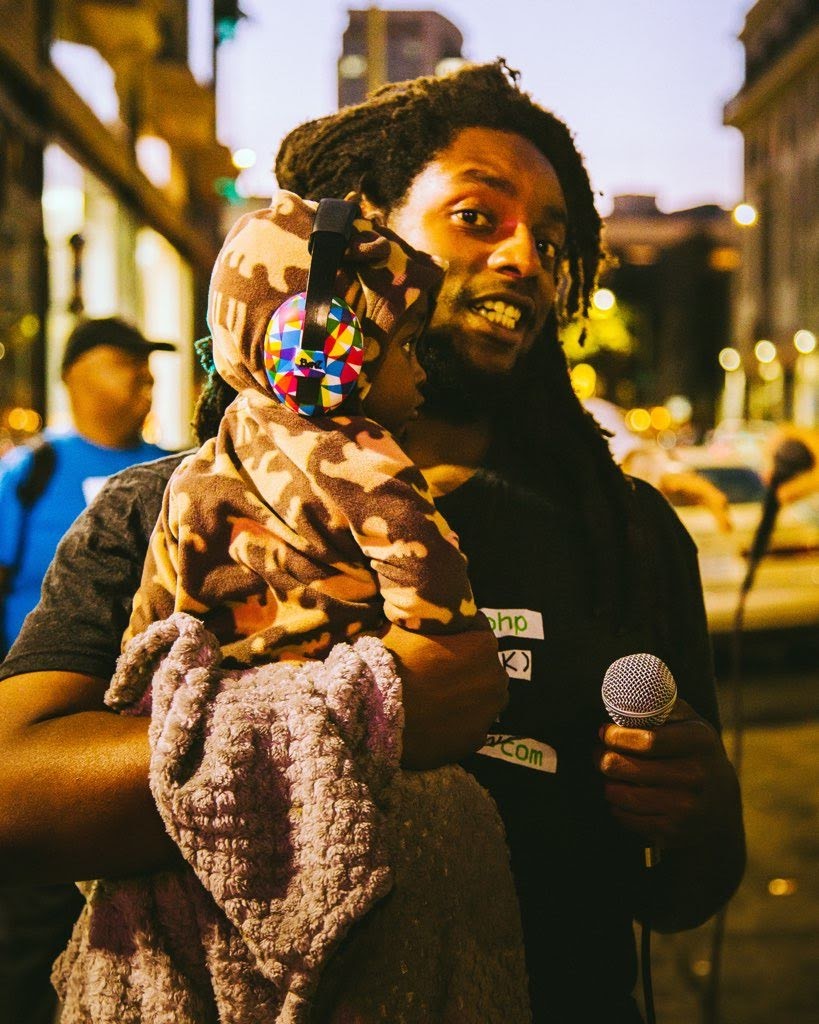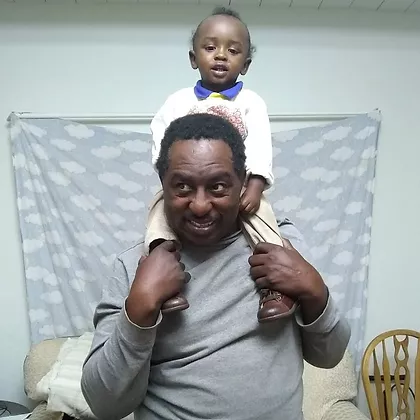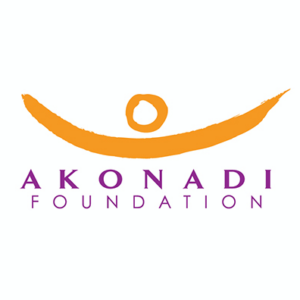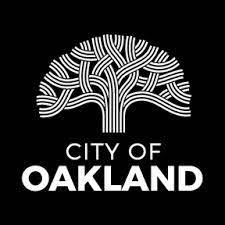
by Najee Amaranth
You Gotta Find You, Yourself
My dad met my mom at a club in Oakland. They hit it off immediately. My father says it was because of my mother’s beautiful smile. When I interview my father for this story, it’s my first time hearing him say that my mother has a beautiful smile. I ain’t gone lie. It warmed my heart. A lot of the things my father shared with me during the interview for this story are details about his life that have remained a mystery to me. I’m xx years old and the only thing I really remember about the relationship between my parents is their break up. I was 13 at the time. Throughout the time I spent with my dad to write this story, we talked a lot about the circumstances surrounding his and my mother’s relationship. It was rewarding to sit down and talk with him after all these years, but this isn’t a story about my mom and dad. It’s about the long road to Oakland that my father traveled to meet my mom at that club in Oakland.
That road begins in Pensacola, Florida, winds across the seas to South Korea, to Germany and back across the ocean to Seattle and finally to Oakland.
Pensacola, The Early Years
1959 to 1975
Dad doesn’t remember a lot of specific times in elementary, but he does remember what it was like and what was going on. He had an acute awareness of his social setting in Florida. In 1954 Brown v. Board ended legal school segregation. In the mid 1960s, Pensacola opened their first integrated school: Jim Allen.
Before integration, there were three primary schools in Pensacola: Jim Allen, an all white elementary school, Ransom, an all black school 1st-12th grades, and Tate, an all white junior/high school. After integration Jim Allen became the elementary, Ransom the middle, and Tate the high school. Before they became fully integrated only a few black students were chosen to go, including my father. Partially because his father, my grandfather, was the custodian at Ransom. In being the custodian he knew a lot of the teachers at the different schools and they knew who his children were. His wife and he taught their children to stay out of trouble, and the teachers kept watchful eyes on them. With these things in mind my father stayed out of trouble and if he did get into it, he definitely didn’t let his parents know.
He talks about having black teachers who looked out for him, small differences in treatment, and the realization that white people don’t all live the lives he’s seen on TV. When the schools became integrated they brought along black staff, in the form of teachers and assistant principals. He says most staff didn’t give him trouble, though some black kids did get a lot of flack. He also remarks that it seemed like black kids got spankings in school more than whites, denoting it to whites feeling a sense of superiority over blacks. Seeing what they were like first hand helped him to understand that they were equals, when at first he thought they were all well off, well behaved and smart. Largely due to the fact that his experiences with whites was limited because of segregation. Integration showed him a side of town that he never fully understood nor felt he belonged in. I asked what he thought of integration and he believes that it was good for us because “You don’t know what you’re missing until you have it.”
In middle school, he really came into his own as a young man, and began to take on an attitude of “ain’t taking no mess”. By this time, he already felt he had to take care of himself. Not because his parents didn’t provide, but because his parents weren’t rough like some other kids’ parents and he didn’t want to get them involved. Middle school passed largely without incident. I don’t think he liked school much. High school is where things began to pop off for him.
High School Years, Military Bound
1975 to 1979
By this time, nobody messed with him because he had established himself as that kind of force. He had two older sisters, Slyvia and Seela. Slyvia, who was the oldest, had a car and would commonly drive her siblings to school. Not always, sometimes they would catch the school bus. My dad tells me how he could have caught the bus on the white side of town, but chose to walk to the bus stop on the black side of town.
Though segregation had lawfully ended, there were still racial tensions in the south. My father being one to avoid trouble in the first place caught the bus with the people he knew best.
Of all the details surrounding his high school career, such as that he could’ve made the football team, he carried a stick with razors in the bottom of it to the jook, and wrote poetry etc, one story sticks out the most. The time him and friends brought his shotgun to the club aka the jook. Normally you weren’t able to bring guns, which was the reason for the stick, but this was an exception. I’m glad nobody got hurt, however my dad did get into some kind of altercation with a young fella who had been known to have killed his friend the year prior. Armed with this knowledge and that shotgun he let his friend, Chug, shoot it in the air when they got outside. Everyone scattered. The story sticks out to me because it reminds me of all of those details that built him into who he was, a young man doing the best he could to stay alive and make something of himself.
Growing up his viewpoint was limited by circumstance. Although whites accepted integration a lot of them still practiced segregation. Black students weren’t informed of the same opportunities as white students, jobs that would hire blacks were mostly “unskilled” labor, and information about the world outside of Pensacola was sparse. By the time he got a partial scholarship my father was done with school and done with Pensacola. Him and his friend Doug decided to join the military hoping to serve their tour anywhere outside of where they lived.
On the day they went in to take the test on what’s called the buddy system, allowing them to go on tour together, Doug was told the military wouldn’t accept him. Interestingly enough, my dad wasn’t told his friend didn’t make it and wound up choosing to go in as a mechanic which was the field they’d both agreed to. The recruiter didn’t tell him and he says he would have chosen a different field if he knew.
The Army Years: From South Korea to Germany
1979 – 1985
While serving in the military, he traveled the world, including Germany, South Korea, and Seattle, eventually settling at a base in California. My dad spent xx years in South Korea, where he said would have spent more time if he could. He tells stories of how you can get Jordan’s for the low and handmade crafts of any design, working on tanks, learning to repel forward, and soldiers catching VD. South Koreans enjoyed the American presence and dollar, North Koreans wanted no parts of it. Some Americans had been killed in North Korea for some sleight against the people there, leading most Americans to stay away. After being stationed in South Korea, my dad was moved to Germany. Germans had superior sound equipment, which he grew to love. After he served in Germany, he decided to finish his tour in Seattle.
From Seattle to the Bay, 1985 til now… Seattle he loved to live in. Something about the clean air attracted him. That’s the one place he said he would’ve actually liked to live. He stayed there for quite some time until Doug, who had joined the navy, convinced him to come down to California. Which to him was no Seattle, but decent enough to plant roots. When he relocated he also switched his occupation to OR Tech (Operating Room Technician), essentially a surgeon’s assistant, because it was available and he wanted something with a long course so they’d have to pay him longer.
He spent several years in the military and it was largely a positive experience for him. It allowed him to travel, get to know people from various backgrounds first hand, and put money in his pocket. Throughout his military career outright racism was looked down upon so he didn’t have to deal with it the way he did back home. I believe this gave him the space to focus on some of the things he really wanted for himself. One dream that he kept from an early age was starting a family. Inadvertently, the military led him to it.
At a club in Oakland is where he met my mom. He says they kicked it off and she had a beautiful smile. That’s something I’ve never heard him say. It warmed my heart, I ain’t gone lie. We talked a lot about the circumstances surrounding their relationship, my half brothers and sisters on my mom’s side, and eventually their break up. I was 13 at the time, and I remember it well because I was there. It’s significant, but it’s a story for another time. In this story my dad and I were able to connect and he told me about his experience of it, which I’d never heard before. I was also able to finally tell him that I wanted to know what was going on. To me that’s closure that we both needed.
Before now I never really thought about asking my father about his past, or his experiences. I’d asked a few questions here and there, but would on occasion come across resistance. Eventually I stopped asking. Personally I’ve been on a journey of self exploration, which gave me access to a level of vulnerability that I’d never had before. I’d like to think because of that I was able to provide space for my pops to open up in a way he hadn’t before.
As our conversation came to a close we laughed and joked about his experiences. At this point I feel like I’m seeing a whole new side of him. I’m seeing a man who has goals, aspirations, fears, and pride in his heart. He told me if there’s anything else I wanted to know that I could ask. Honestly I didn’t know if I could before. Now that the doors are open our relationship can grow again. Now I have more stories to tell my children when they wonder what things used to be like.


by Najee Amaranth
Najee Amaranth is a father, cultural advocate and co-founder of Oakland Mind, a creative collective. Through his collective, he has created spaces for artists, brought awareness to human trafficking, and even taught hip hop at several colleges. He utilizes hip hop art to explore what a culture can be and uses knowledge to raise funds to support sustainable actions within the community.


